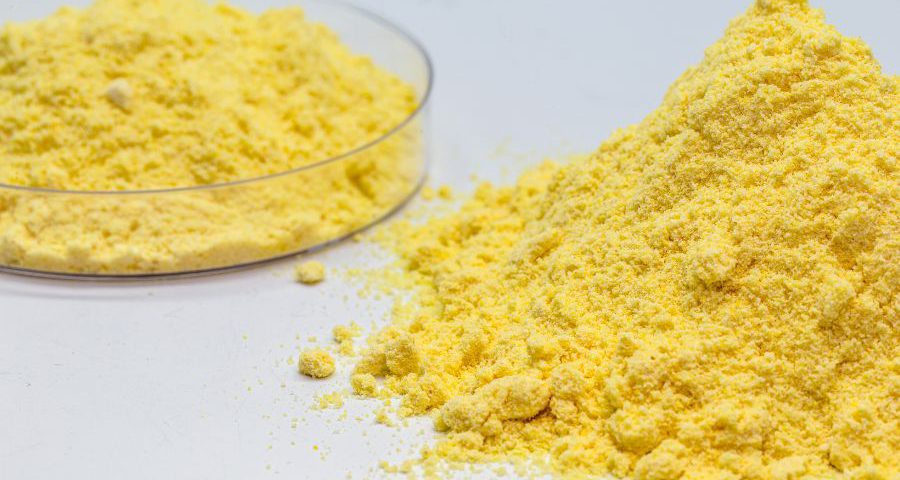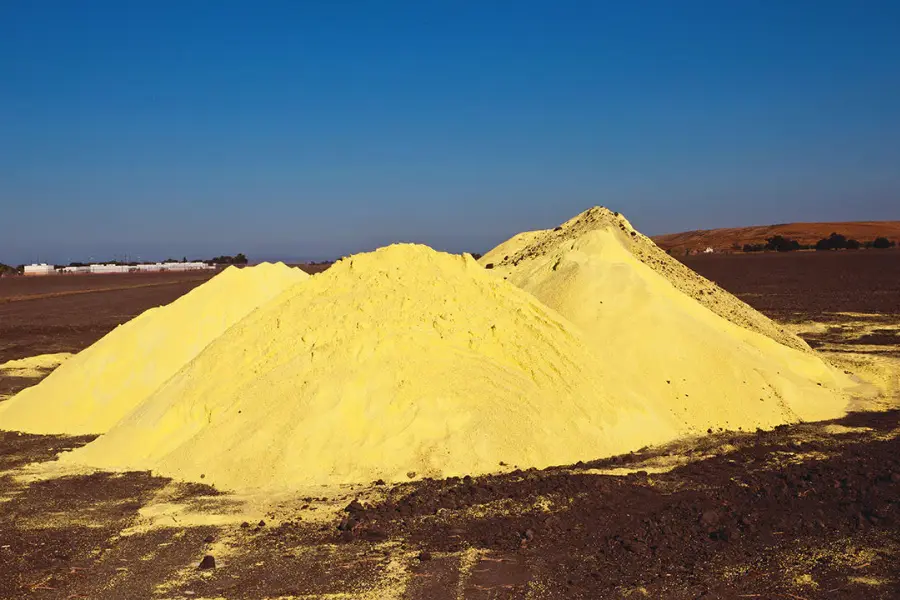
What are the different forms of sulfur?
February 24, 2024
Is sulfur safe for humans? Evaluating the Risks
March 5, 2024Sulfur is crucial in everyday life, playing a role in various industries and applications. It is used in the production of sulfuric acid, one of the most widely used industrial chemicals. Sulfur is also a key component in the production of fertilizers, helping to improve soil fertility and crop yields.
Additionally, sulfur is used in the vulcanization of rubber, making it more durable and elastic. Its compounds are also used in the production of detergents, dyes, and pharmaceuticals, highlighting its significance in numerous aspects of modern life.
This post addresses the question ‘Where is sulfur used in everyday life?’ by exploring its role across various industries and applications. The post highlights sulfur’s significance in modern society, emphasizing its multifaceted contributions to agriculture, industry, healthcare, etc. Through its versatile applications, sulfur emerges as a fundamental element essential for sustaining and enriching everyday living.
Where Is Sulfur Used In Everyday Life
Sulfur is a versatile element with widespread applications in various industries. It is commonly used in the production of fertilizers, where it plays a vital role in improving soil fertility and crop yields.
Additionally, sulfur is a key component in the manufacturing of sulfuric acid, rubber vulcanization, and pharmaceuticals. Its preservative properties also make it valuable in the food industry. Sulfur’s diverse uses highlight its importance in everyday life.
Sulfur in Agriculture
Sulfur plays a crucial role in agriculture, serving multiple purposes to enhance crop growth and yield. It is utilized as a soil amendment to correct alkaline soils and improve overall soil health. It helps lower pH levels, making essential nutrients more available to plants.
Additionally, sulfur is a key component of fertilizers, particularly in the form of sulfates, which provide plants with a vital nutrient. Sulfur is essential for the synthesis of amino acids and proteins, contributing to plant growth and development.
Sulfur is used in agriculture for pest and fungi control. It acts as a natural pesticide and fungicide, helping to combat various plant diseases and pests, reducing the need for chemical interventions. The multifaceted role of sulfur in agriculture highlights its importance in sustainable farming practices.
Sulfur in Industry

Sulfur is a versatile element with a wide range of industrial applications, playing a crucial role in processes ranging from the production of chemicals to petroleum refining.
Production of Sulfuric Acid
Sulfur is a major element in the production of sulfuric acid, a compound widely used in various industries. The manufacturing process begins with the combustion of sulfur, yielding sulfur dioxide, which is then oxidized to sulfur trioxide in the presence of a catalyst.
Sulfur trioxide is then dissolved in water to form sulfuric acid. This acid is a crucial component in the production of fertilizers, detergents, and pharmaceuticals, highlighting the importance of sulfur in industrial processes.
Manufacturing of Chemicals
Sulfur plays a major role in the manufacturing of various chemicals, including rubber and detergents. In the rubber industry, sulfur is used in the vulcanization process, which improves the elasticity and durability of rubber products.
Additionally, sulfur compounds are used in the production of detergents, where they help in removing dirt and grease. These applications demonstrate sulfur’s versatility and importance in enhancing the properties of a wide range of products.
Use in Petroleum Refining
Sulfur is extensively used in petroleum refining processes. It is primarily used in hydrodesulfurization, a process that removes sulfur compounds from crude oil and natural gas.
Hydrodesulfurization is crucial for producing cleaner fuels with reduced sulfur content, which is essential for meeting environmental regulations and improving air quality.
Sulfur’s role in petroleum refining highlights its significance in producing cleaner and more efficient fuels for various applications.
Sulfur in Health and Medicine
Sulfur is utilized in health and medicine for its various beneficial properties. In skincare, sulfur is a common ingredient in products aimed at treating acne, eczema, and psoriasis due to its antimicrobial and anti-inflammatory properties.
It works by reducing the growth of bacteria on the skin and helping to unclog pores. Additionally, sulfur is used in some prescription medications for the treatment of scabies and seborrheic dermatitis.
Its keratolytic properties help to soften and exfoliate the skin, making it effective in managing these conditions. Sulfur’s presence in skincare products and medications highlights its importance in maintaining skin health and treating various skin conditions.
Sulfur in Food and Beverages

Sulfur is widely used in the food and beverage industry for its various functions. One of its primary uses is as a preservative, where it helps to extend the shelf life of certain foods by inhibiting the growth of microorganisms.
Sulfur dioxide, a common sulfur compound, is used in dried fruits, wine, and fruit juices to prevent spoilage and discoloration. Additionally, sulfur is used as a flavor enhancer in certain foods, adding a distinctive tangy taste.
In beverages, sulfur dioxide is used in winemaking to prevent oxidation and microbial spoilage, preserving the wine’s flavor and aroma. In general, sulfur plays a crucial role in the food and beverage industry, ensuring the safety and quality of various products.
Sulfur in Daily Household Items
Sulfur-based pesticides and insecticides are widely used in agriculture and gardening due to their effectiveness in controlling pests and fungi. These compounds act as potent fungicides, insect repellents, and miticides. Examples include sulfur dust, lime-sulfur spray, and sulfur-based granules.
Sulfur is a crucial component in the production of matches, particularly in the match heads where it facilitates ignition. The combustion of sulfur compounds aids in igniting phosphorus, enabling the match to light. Historically, sulfur was also a key ingredient in gunpowder, contributing to its explosive properties.
Sulfur plays a vital role in the vulcanization process of rubber, enhancing its elasticity, durability, and resistance to heat and aging. Vulcanization involves heating natural rubber with sulfur to form cross-links between polymer chains. This process results in vulcanized rubber, which is used in a multitude of household items such as tires, shoe soles, gaskets, seals, and rubber bands.
Final Thoughts
Sulfur is undeniably indispensable in everyday life, with its multifaceted importance spanning across numerous industries and applications. From agriculture to industry, sulfur serves as a crucial component, aiding in soil fertility, chemical production, and even pest control. When considering the question ‘Where is sulfur used in everyday life,’ its roles in these diverse sectors highlight its fundamental significance in sustaining modern living.
Its presence in skincare products, medications, and food preservation underscores its significance in health, while its role in enhancing flavor in certain foods and beverages adds to its versatility. Sulfur’s impact is felt globally, touching almost every aspect of modern life.
The diverse uses of sulfur highlight its adaptability and indispensability in various aspects of human existence. From its role in agriculture, industry, and healthcare to its presence in everyday products and culinary delights, sulfur continues to demonstrate its significance in enriching and sustaining our lives.
As technology advances and new discoveries are made, the importance of sulfur in everyday life is likely to evolve, further solidifying its position as a fundamental element in the modern world.
FAQs
Here are some of the Frequently Asked Questions about the use of sulfur in everyday life:
What major applications does sulfur have in everyday life?
Sulfur serves as a crucial component in the production of matches, aiding in the ignition process. Additionally, sulfur contributes to the vibrant colors produced in fireworks and sulfur dioxide is used in food preservation, particularly in dried fruits, to prevent spoilage and maintain their visual appeal. It is also important in water treatment processes.
Is sulfur used in household cleaning products?
Yes, sulfur is commonly found in household cleaning products such as disinfectants, bleach, and laundry detergents. It helps in removing stains, killing bacteria, and deodorizing surfaces. Its antimicrobial properties make it particularly useful in disinfectants, where it helps to eliminate harmful pathogens and maintain a healthy environment.
What role does sulfur play in the construction industry?
Sulfur compounds are used in the production of construction materials such as concrete and asphalt. Additionally, sulfur-based compounds are utilized in the manufacturing of certain types of adhesives and sealants used in construction projects.



